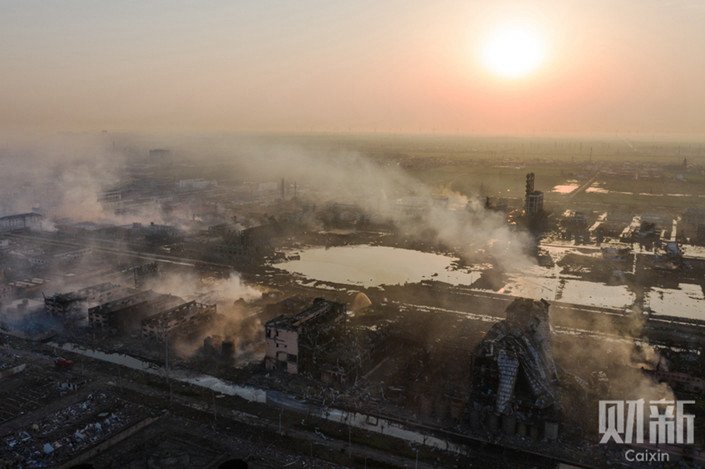Mar 27, 2019 07:34 PM
CHINA无效
Reporter’s Notebook: Xiangshui Blast Leaves Wounds and Scars That Won’t Fade

At the explosion site 40 hours after the blast, smoke continues to rise around the crater. Photo: Liang Yingfei/Caixin
On the afternoon of March 21, I was in Zhenjiang, a city in Jiangsu province, working on a story. As my interview wrapped up, I looked at my phone — an explosion had happened in Xiangshui, only 333 kilometers (207 miles) away. As night fell and I approached my destination, the highway was filled with fire trucks and ambulances going from Yancheng and nearby Sheyang county to the site. The sheer number of rescue vehicles on the road gave me the feeling that the scene I was approaching would be very different from anything I had seen before. The silence of slow-moving traffic along the dark highway was broken by wailing sirens.

You've accessed an article available only to subscribers
VIEW OPTIONS
Share this article
Open WeChat and scan the QR code
MOST POPULAR
- 1Cover Story: China Carves Out a Narrow Path for Offshore Asset Tokenization
- 2Drownings Shake Chinese Enthusiasm for Travel to Russia
- 3Over Half of China’s Provinces Cut Revenue Targets
- 4Li Ka-Shing’s Port Empire Hit by Forced Takeover Amid Panama Legal Dispute
- 5In Depth: China’s Mutual Fund Industry Faces Overhaul After a Banner 2025
GALLERY
SPONSORED
- 1Power To The People: Pintec Serves A Booming Consumer Class
- 2Largest hotel group in Europe accepts UnionPay
- 3UnionPay mobile QuickPass debuts in Hong Kong
- 4UnionPay International launches premium catering privilege U Dining Collection
- 5UnionPay International’s U Plan has covered over 1600 stores overseas



